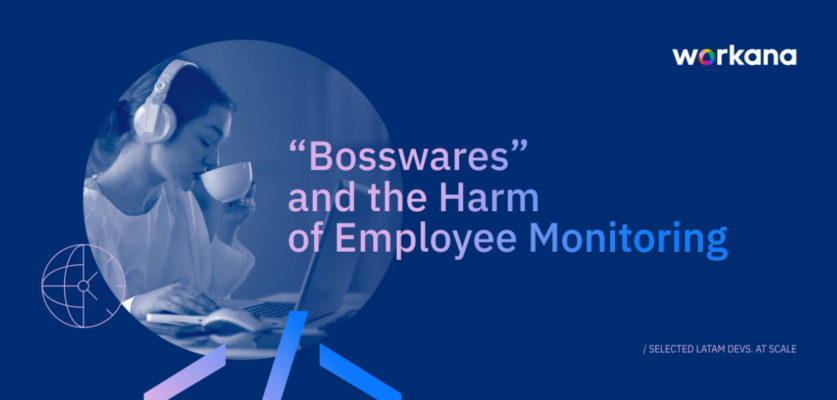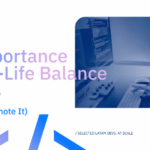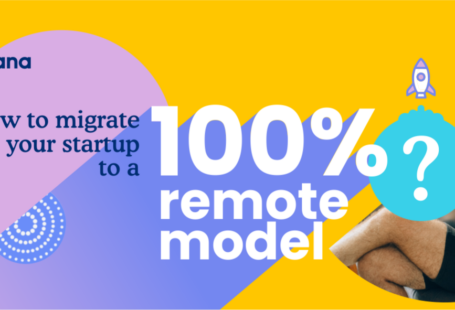Companies that create and use them call them “time trackers” or “productivity management tools,” but their unofficial title is bossware. For as many names as they have, the name “bossware” in and of itself tells us a lot about the defensive and distrustful environment that these surveillance (and occasionally spyware) programs create and how they make collaborators feel while working.
Bossware encompasses a wide variety of computer programs with the purpose of allowing the employer to monitor what their employees are doing on their computers every minute. From statistics related to the keyboard and mouse movements to detailed information on open apps and pages, and even total real-time access to the employee’s screen or webcams in the most extreme cases, bossware puts employees under a microscope.
It’s a control strategy that’s existed for decades in some capacity. With the onset of the pandemic and the subsequent rapid shift to remote work, bossware became more popular for obvious reasons.
In theory, employees should be notified that they’re being monitored. However, companies are often less than transparent about what and how they monitor their employees.
Below, we’ll explain five good reasons why using bossware with your remote teams isn’t the best idea, at least if you want to make the most of the benefits of a good work environment.
Five Reasons Why Bossware Negatively Impacts Remote Teams
1.- Increasing productivity isn’t the same as increasing efficiency
Spending hours and hours logged into virtual work environments and even working on a lot of tasks doesn’t necessarily guarantee that you’re being productive or efficient.
The goal of any manager should be to help their team in a more intelligent manner. In other words, their goal should be to drive better results with less effort. Unfortunately bossware tends to achieve the exact opposite of this by requiring people to meet arbitrary criteria that are more focused on increasing effort and decreasing rest instead of optimizing the work in and of itself.
Even Microsoft (that offers plenty of bossware options) warns that, “companies should be careful so they don’t end up monitoring aspects that aren’t relevant to employee performance.” This can include the time that an employee spends in front of the computer or using wor programs or the number of breaks they take.
2.- Maximum productivity in the short term doesn’t result in a good return on investment in the long term
The most popular argument in favor of surveillance programs is that it helps employees “work” for longer periods of time. We’ve already seen how this isn’t a guarantee that they’re working efficiently. It also has negative medium and long term consequences that could outweigh any small increase in productivity that might be achieved from using bossware in the short term.
First of all, bossware puts a significant amount of stress on team members. Work stress is directly related to absenteeism. Second of all, company policies that involve close surveillance or border on spying are great ways to repel talent. Micromanaged talent will gladly work for competition that’s willing to trust them and their employees.
3.- Healthy competition between pairs is much more effective than hierarchical surveillance
If you want to boost productivity, let your employees manage each other instead of you watching over them. There’s a good reason for this. With a transparent, collaborative work environment that allows everyone to see what the others are doing, someone will always keep an eye on the project. In that case, nobody will want to fall behind, and that’s why healthy, continuous comparison between peers is so important.
Then, add a good gamification strategy to this. If you focus on results-oriented KPIs and provide a dashboard that’s always visible to everyone with the best team members’ numbers, your team members will be much more motivated to do their best.
4-. Bossware Ruins the Work Environment
A manager can have all the leadership skills in the world, but if they’re using bossware to monitor their team, it’s impossible for them to not communicate a major lack of trust. How can you create a positive work environment if nobody trusts each other?
It’s not just about watching or not watching people to make sure they’re doing what they’re paid to do. Using bossware also sends a message that the user believes employees will take advantage of them if they have the opportunity to. Psychologically speaking, that’s also the equivalent of saying that the company will try to take advantage of collaborators, and that suggests that the company views its employees as replaceable cogs in a wheel as opposed to human beings. These messages will inevitably lead to a work environment that’s founded on distrust.
5.- You Can Invest Those Resources Into More Efficient Strategies
Generally speaking, bossware solutions cost money. There are some programs that are cheaper than others, but the ones with relatively attractive features tend to be costly. We already saw that the return on investment for these programs may be immediate but isn’t sustainable over time.
So why not invest those resources in better strategies? Here are three alternatives to start:
- Gamifying workflow to foster healthy competition between pairs,
- Investing in better compensation to improve employee motivation, and
- Consulting a team of experts before hiring a new remote collaborator in order to make sure that the person you hire has the self-management and soft skills necessary to be efficient and work independently.
Conclusion: Just Say No to Bossware!
Employees see bossware as a major invasion of privacy and clear proof the company and/or boss doesn’t trust them. This lack of trust goes as far as to demonstrate a lack of appreciation for their work. Not to mention, these programs could be hacked by highly-skilled collaborators on remote developer and programming teams.
In conclusion, while bossware may seem useful to an extent, it only superficially alleviates any concerns. Instead of solving the problem, it makes your collaborators genuinely less motivated and can even compromise their commitment to the project and the company.
Hiring the right people with all the technical skills that you need is the first step to creating an efficient, committed, remote team that achieves all of your goals. These new team members should also be goal-oriented with demonstrable self-management skills.
At Workana, we help you find the professionals that you need for your dream team. We even offer a seven-day, risk-free trial unlike any other on the market. That way you can see a dev’s work for yourself and ensure that you’re making the best hiring decision possible. Ready to get started?
You may also be interested in:









